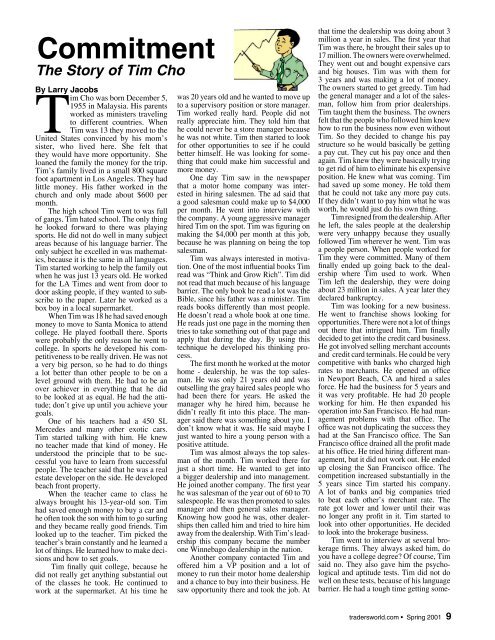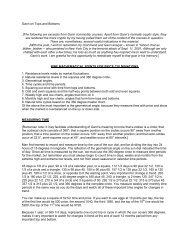Create successful ePaper yourself
Turn your PDF publications into a flip-book with our unique Google optimized e-Paper software.
Commitment<br />
The Story of Tim Cho<br />
By Larry Jacobs<br />
Tim Cho was born December 5,<br />
1955 in Malaysia. His parents<br />
worked as ministers traveling<br />
to different countries. When<br />
Tim was 13 they moved to the<br />
United States convinced by his mom’s<br />
sister, who lived here. She felt that<br />
they would have more opportunity. She<br />
loaned the family the money for the trip.<br />
Tim’s family lived in a small 800 square<br />
foot apartment in Los Angeles. They had<br />
little money. His father worked in the<br />
church and only made about $600 per<br />
month.<br />
The high school Tim went to was full<br />
of gangs. Tim hated school. The only thing<br />
he looked forward to there was playing<br />
sports. He did not do well in many subject<br />
areas because of his language barrier. The<br />
only subject he excelled in was mathematics,<br />
because it is the same in all languages.<br />
Tim started working to help the family out<br />
when he was just 13 years old. He worked<br />
for the LA Times and went from door to<br />
door asking people, if they wanted to subscribe<br />
to the paper. Later he worked as a<br />
box boy in a local supermarket.<br />
When Tim was 18 he had saved enough<br />
money to move to Santa Monica to attend<br />
college. He played football there. Sports<br />
were probably the only reason he went to<br />
college. In sports he developed his competitiveness<br />
to be really driven. He was not<br />
a very big person, so he had to do things<br />
a lot better than other people to be on a<br />
level ground with them. He had to be an<br />
over achiever in everything that he did<br />
to be looked at as equal. He had the attitude;<br />
don’t give up until you achieve your<br />
goals.<br />
One of his teachers had a 450 SL<br />
Mercedes and many other exotic cars.<br />
Tim started talking with him. He knew<br />
no teacher made that kind of money. He<br />
understood the principle that to be successful<br />
you have to learn from successful<br />
people. The teacher said that he was a real<br />
estate developer on the side. He developed<br />
beach front property.<br />
When the teacher came to class he<br />
always brought his 13-year-old son. Tim<br />
had saved enough money to buy a car and<br />
he often took the son with him to go surfi ng<br />
and they became really good friends. Tim<br />
looked up to the teacher. Tim picked the<br />
teacher’s brain constantly and he learned a<br />
lot of things. He learned how to make decisions<br />
and how to set goals.<br />
Tim fi nally quit college, because he<br />
did not really get anything substantial out<br />
of the classes he took. He continued to<br />
work at the supermarket. At his time he<br />
was 20 years old and he wanted to move up<br />
to a supervisory position or store manager.<br />
Tim worked really hard. People did not<br />
really appreciate him. They told him that<br />
he could never be a store manager because<br />
he was not white. Tim then started to look<br />
for other opportunities to see if he could<br />
better himself. He was looking for something<br />
that could make him successful and<br />
more money.<br />
One day Tim saw in the newspaper<br />
that a motor home company was interested<br />
in hiring salesmen. The ad said that<br />
a good salesman could make up to $4,000<br />
per month. He went into interview with<br />
the company. A young aggressive manager<br />
hired Tim on the spot. Tim was fi guring on<br />
making the $4,000 per month at this job,<br />
because he was planning on being the top<br />
salesman.<br />
Tim was always interested in motivation.<br />
One of the most infl uential books Tim<br />
read was “Think and Grow Rich”. Tim did<br />
not read that much because of his language<br />
barrier. The only book he read a lot was the<br />
Bible, since his father was a minister. Tim<br />
reads books differently than most people.<br />
He doesn’t read a whole book at one time.<br />
He reads just one page in the morning then<br />
tries to take something out of that page and<br />
apply that during the day. By using this<br />
technique he developed his thinking process.<br />
The fi rst month he worked at the motor<br />
home - dealership, he was the top salesman.<br />
He was only 21 years old and was<br />
outselling the gray haired sales people who<br />
had been there for years. He asked the<br />
manager why he hired him, because he<br />
didn’t really fi t into this place. The manager<br />
said there was something about you. I<br />
don’t know what it was. He said maybe I<br />
just wanted to hire a young person with a<br />
positive attitude.<br />
Tim was almost always the top salesman<br />
of the month. Tim worked there for<br />
just a short time. He wanted to get into<br />
a bigger dealership and into management.<br />
He joined another company. The fi rst year<br />
he was salesman of the year out of 60 to 70<br />
salespeople. He was then promoted to sales<br />
manager and then general sales manager.<br />
Knowing how good he was, other dealerships<br />
then called him and tried to hire him<br />
away from the dealership. With Tim’s leadership<br />
this company became the number<br />
one Winnebago dealership in the nation.<br />
Another company contacted Tim and<br />
offered him a VP position and a lot of<br />
money to run their motor home dealership<br />
and a chance to buy into their business. He<br />
saw opportunity there and took the job. At<br />
that time the dealership was doing about 3<br />
million a year in sales. The fi rst year that<br />
Tim was there, he brought their sales up to<br />
17 million. The owners were overwhelmed.<br />
They went out and bought expensive cars<br />
and big houses. Tim was with them for<br />
3 years and was making a lot of money.<br />
The owners started to get greedy. Tim had<br />
the general manager and a lot of the salesman,<br />
follow him from prior dealerships.<br />
Tim taught them the business. The owners<br />
felt that the people who followed him knew<br />
how to run the business now even without<br />
Tim. So they decided to change his pay<br />
structure so he would basically be getting<br />
a pay cut. They cut his pay once and then<br />
again. Tim knew they were basically trying<br />
to get rid of him to eliminate his expensive<br />
position. He knew what was coming. Tim<br />
had saved up some money. He told them<br />
that he could not take any more pay cuts.<br />
If they didn’t want to pay him what he was<br />
worth, he would just do his own thing.<br />
Tim resigned from the dealership. After<br />
he left, the sales people at the dealership<br />
were very unhappy because they usually<br />
followed Tim wherever he went. Tim was<br />
a people person. When people worked for<br />
Tim they were committed. Many of them<br />
fi nally ended up going back to the dealership<br />
where Tim used to work. When<br />
Tim left the dealership, they were doing<br />
about 23 million in sales. A year later they<br />
declared bankruptcy.<br />
Tim was looking for a new business.<br />
He went to franchise shows looking for<br />
opportunities. There were not a lot of things<br />
out there that intrigued him. Tim fi nally<br />
decided to get into the credit card business.<br />
He got involved selling merchant accounts<br />
and credit card terminals. He could be very<br />
competitive with banks who charged high<br />
rates to merchants. He opened an offi ce<br />
in Newport Beach, CA and hired a sales<br />
force. He had the business for 5 years and<br />
it was very profi table. He had 20 people<br />
working for him. He then expanded his<br />
operation into San Francisco. He had management<br />
problems with that offi ce. The<br />
offi ce was not duplicating the success they<br />
had at the San Francisco offi ce. The San<br />
Francisco offi ce drained all the profi t made<br />
at his offi ce. He tried hiring different management,<br />
but it did not work out. He ended<br />
up closing the San Francisco offi ce. The<br />
competition increased substantially in the<br />
5 years since Tim started his company.<br />
A lot of banks and big companies tried<br />
to beat each other’s merchant rate. The<br />
rate got lower and lower until their was<br />
no longer any profi t in it. Tim started to<br />
look into other opportunities. He decided<br />
to look into the brokerage business.<br />
Tim went to interview at several brokerage<br />
fi rms. They always asked him, do<br />
you have a college degree? Of course, Tim<br />
said no. They also gave him the psychological<br />
and aptitude tests. Tim did not do<br />
well on these tests, because of his language<br />
barrier. He had a tough time getting some-<br />
tradersworld.com Spring 2001 9






